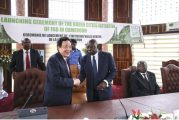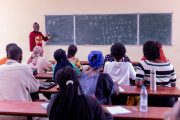Categories
Recent Posts
- Southern Cameroons refugees in Nigeria receive farm seedlings
- Douala: Investment Forum wraps up with honors for investment champions
- Understanding the Biya Francophone regime’s support for the Israeli genocide in Gaza
- US: Prosecution lays out ‘criminal conspiracy’ as Trump’s hush money trial opens
- FAO formally launches Green Cities Initiative in Cameroon
Archives
- April 2024
- March 2024
- February 2024
- January 2024
- December 2023
- November 2023
- October 2023
- September 2023
- August 2023
- July 2023
- June 2023
- May 2023
- April 2023
- March 2023
- February 2023
- January 2023
- December 2022
- November 2022
- October 2022
- September 2022
- August 2022
- July 2022
- June 2022
- May 2022
- April 2022
- March 2022
- February 2022
- January 2022
- December 2021
- November 2021
- October 2021
- September 2021
- August 2021
- July 2021
- June 2021
- May 2021
- April 2021
- March 2021
- February 2021
- January 2021
- December 2020
- November 2020
- October 2020
- September 2020
- August 2020
- July 2020
- June 2020
- May 2020
- April 2020
- March 2020
- February 2020
- January 2020
- December 2019
- November 2019
- October 2019
- September 2019
- August 2019
- July 2019
- June 2019
- May 2019
- April 2019
- March 2019
- February 2019
- January 2019
- December 2018
- November 2018
- October 2018
- September 2018
- August 2018
- July 2018
- June 2018
- May 2018
- April 2018
- March 2018
- February 2018
- January 2018
- December 2017
- November 2017
- October 2017
- September 2017
- August 2017
- July 2017
- June 2017
- May 2017
- April 2017
- March 2017
- February 2017
- January 2017
- December 2016
- November 2016
- October 2016
- September 2016
- August 2016
- July 2016
- June 2016
Featured
 Understanding the Biya Francophone regime’s support for the Israeli genocide in Gaza
Understanding the Biya Francophone regime’s support for the Israeli genocide in Gaza  Poverty under Biya: Cameroonians embrace Chinese language for brighter futures
Poverty under Biya: Cameroonians embrace Chinese language for brighter futures  Cameroon is broken: Who can fix it?
Cameroon is broken: Who can fix it?  Ethiopia: U.S Senator Cardin Statement on the Killing of Bate Urgessa
Ethiopia: U.S Senator Cardin Statement on the Killing of Bate Urgessa  Battle for the Unity Palace: ANNOUNCEMENT!
Battle for the Unity Palace: ANNOUNCEMENT!
Most Commented Posts
 4 Anglophone detainees killed in Yaounde
4 Anglophone detainees killed in Yaounde
19 comments Chantal Biya says she will return to Cameroon if General Ivo Yenwo, Martin Belinga Eboutou and Ferdinand Ngoh Ngoh are sacked
Chantal Biya says she will return to Cameroon if General Ivo Yenwo, Martin Belinga Eboutou and Ferdinand Ngoh Ngoh are sacked
13 comments Anglophone Nationalism: Barrister Eyambe says “hidden plans are at work”
Anglophone Nationalism: Barrister Eyambe says “hidden plans are at work”
12 comments The Anglophone Problem – When Facts don’t Lie
The Anglophone Problem – When Facts don’t Lie
12 comments Largest wave of arrest by BIR in Bamenda
Largest wave of arrest by BIR in Bamenda
10 comments
Latest Tweets
Featured
-

Southern Cameroons refugees in Nigeria receive farm seedlings
-

Douala: Investment Forum wraps up with honors for investment champions
-

Understanding the Biya Francophone regime’s support for the Israeli genocide in Gaza
-

US: Prosecution lays out ‘criminal conspiracy’ as Trump’s hush money trial opens
-

FAO formally launches Green Cities Initiative in Cameroon
-

Football: Barcelona wants Clasico replay if Yamal ‘ghost goal’ call wrong
-

Poverty under Biya: Cameroonians embrace Chinese language for brighter futures
© Cameroon Concord News 2024
25, June 2017
Southern Cameroon Crisis: Chief Charles Taku break silence to rubbish utterly ridiculous claims by Dr. Tikum Mbah Azonga 0
Permit me to add a few critical comments on the opinion of my friend Tikum Mbah Azonga. I regret the paucity of critical thought in his commentary on this matter. First he seems to have borrowed his title that suggests a North West/South West divide from contemporary political discourse. As the title suggests, his opinion cannot be construed as academic or intellectual. The premise on which Tikum has premised his opinion falls within the the ideological construct of the wider politics of ethnicity that the offspring of Louis Aujoulat have successfully relied on to emasculate, control and eternalise power in the French vassal state of La Republique du Cameroun. In his analysis therefore, Tikum Mbah Azonga conflates the migration patterns that brought persons from the hinterlands of the Southern Cameroons to the coastal areas. This cannot be characterized as a South West/North West problem because the migration trend did not see the people from the grasslands move to Mamfe area, the Bangwa and Mundani areas, the Kumba, Bakossi and obviously Ndian areas as such.
These people indeed joined the migration towards the coastal areas of Victoria and Kumba. Pointing to this and inciting all Southern Westerners to construe this as an entirely South West problem is an unacceptable misjudgment. The migration towards these areas were not always voluntary from inception. History has it that the Germans forcefully drafted people from the hinterlands to work in the plantations in the coastal areas. Hundreds of Bangwa youths were taken to the plantations by Gustav Conrad and never returned leading to the Bangwa /German war in which the Germans committed a genocide against the Bangwa people and looted prized statures and artifacts among them the Bangwa Queen and the Bangwa King on display in a Museum in Paris presently and estimated to cost hundreds of thousands of dollars. It is unfortunate that the desperate and indiscriminate celebration of the politics of ethnicity has led to the looting and torching of the property of the same Bangwa people in Kombone, Marumba and some locations in Meme led then by a former anti- settler/anti-Bangwa former Government Delegate of the then Kumba Urban Council.
I personally intervened through a law suit to force the individual to compensate Bangwa people whose property and cars he destroyed in Kumba. Thanks to the late Barrister A. T Enaw, he accepted responsibility and paid for the damage he caused to these people for being Bangwa and settling in Kumba. The farmers in Marumba, Kombone and other locations were never compensated. The land holding of the migrant population pursuant to the Land and Native Rights Ordinance that was applicable in the Southern Cameroons, granted them land on term leases, usufructory land rights and other patterns of land holdings which left title and ownership of the lands to the natives. Till date the land holding ” two parties” farming system practiced in some rural farming communities is inspired by the Land and Native Rights Ordinance. The people lived peacefully in the communities into which they migrated and settled without any tensions or problems until La Republique abolished the Land and Native Rights Ordinance and replaced with the Cameroon Land Ordinance. Over night the natives learned that their native lands had become ” national lands” and that occupiers could hence apply to the land consultative boards presided over by mainly Francophone District Officers for land certificates. This was and has been the source of conflict targeting not just migrants from other parts of the Southern Cameroons but all migrant communities.
For some unexplained reasons, persons including my good friend Tikum Mbah Azonga writing on this matter failed to mention that the proconsuls have benefited and are benefiting so much in the exercise of this power of so-called national land ownership to sell off or allocate prized land in the Southern Cameroons to citizens of La Republique. The land ordinance is one piece of colonial annexation laws by which our land has been sold or appropriated by the occupier. On this basis, the occupier has sold off ancestral lands of whole communities in Ndian, Manyu, Kupe Manegumba with the complicity of some local elites and Chiefs to a nebulous mafia palm plantation cooperation. The power elite that has been supporting the conflict against Southern Cameroonians went silent, and when they spoke, they supported it the land grab over the overwhelming opposition of their own people. Pamol would have been taken over by the French using one Christian Mure as a front but for the very courageous opposition led by Hon Ogork Ntui and a courageous Justice Paul Ayah then President of the High Court of Ndian. Lately a very courageous Police Superintendent Helen Esoka raised and alarm about criminal land deals in Fako Division in which colonial administrators illegally appropriated land and sold some to their kith and kin in La Republique depriving the Fako people of their ancestral lands and this ongoing thievery does not inspire any one writing on this subject. I gave an interview in the Post Newspaper last year in which I predicted that land administration and land grab in the Southern Cameroons was a time bomb waiting to explode. It is on the minds of the people in ignoring the so-called North West/ South West conflict brought to the fore every time the victims of colonial rule commence revolutionary action to free themselves from colonial rule.
When Helen Esoka denounced the land mafia in Fako at the risk of her life and job, we did not react. We allowed her suffer the result of her patriotic effrontery against a ruthless regime. But then one of the reasons why the citizenry of the Southern Cameroons have risen and taken their destiny into their hands arises from the rape of our economy, illegal land grab, indignities committed on our women and girls, the rape of our girls in the University of Buea which shocked and continues to shock our collective consciences, the state of collective imprisonment, cultural genocide and the suffocating corruption that has left otherwise competent people like Dr Tikum Mbah Azonga struggling to just be given the opportunity on the merit to serve their own people and community. The Southern Cameroons revolution will succeed and serve our people if we critically identify the problems we have faced under colonial rule and cultural genocide and collectively join our people to combat them. Our people at the grassroots are not in this revolution to celebrate slogans and misplaced epistles of distraction. They care about land ownership.
Simply put, who owns their ancestral land, and where can they get a redress to protect their ancestral land owning rights? La Republique’s corrupt administrators or their Chiefs and customary courts as ordained by the Land and Native Rights Ordinance? Who controls their local councils? Who controls the administration of their schools, colleges and universities? Who decides how and where they travel to within their territory? Which courts resolves their disputes? Who governs them? Who makes a day to day decision about their lives, who selects their leaders for them? Who governs them? How do they vote and when? We must therefore correctly identify, analyse and seek solutions to these revolution sustaining problems instead of pandering to the policies and agenda of our adversary. In a revolution, you either join the revolutionary train or left behind. Those who previously thought they can control the thought process of the citizenry in the Southern Cameroons should by now see how irrelevant they are.
Not even our Chiefs, the power elite, armies of oppression, corruption and mystical conjuring with halt the revolutionary train. It has taken off for good. Even in La Republique du Cameroun the people have learnt about the limit of brutish power. They are carefully studying the Southern Cameroons revolution and very soon, their adored and celebrated dictatorship will collapse on its own weight. In this situation therefore we should learn that there is always a sense of urgency and immediacy in the spirit and language of every revolution. No one should attempt to change the subject because prior to engaging the revolution, the people considered all the events that have occurred and are occurring in their lives. The subject my friend Tikum Mbah Azonga has chosen to introduce in to the discourse at this point in time is critically not on the peoples’ agenda. Atanga Nji and Mafany Musonge attempted to place it on the agenda and failed woefully
By Chief Charles A. Taku